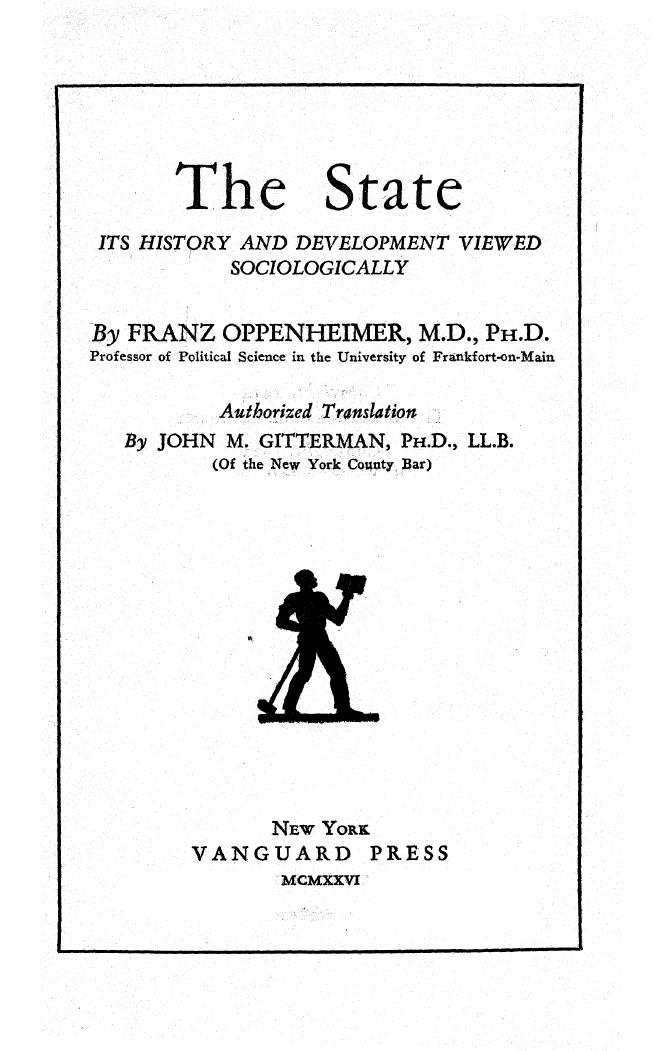The State by Franz Oppenheimer

Author:Franz Oppenheimer
Language: eng
Format: epub, pdf
Publisher: Perennial Press
* * *
CHAPTER V
THE DEVELOPMENT OF THE FEUDAL STATE
~
(a) THE GENESIS OF LANDED PROPERTY
WE NOW RETURN, AS STATED above, to that point where the primitive feudal State gave rise to the city State as an offshoot, to follow the upward growth of the main branch. As the destiny of the city State was determined by the agglomeration of that form of wealth about which the State swung in its orbit, so the fate of the territorial State is conditioned by that agglomeration of wealth which in turn controls its orbit, the ownership of landed property.
In the preceding, we followed the economic differentiation in the case of the shepherd tribes, and showed that even here the law of the agglomeration about existing nuclei of wealth begins to assert its efficacy, as soon as the political means comes into play, be it in the form of wars for booty or still more in the form of slavery. We saw that the tribe had differentiated nobles and common freemen, beneath whom slaves, being without any political rights, are subordinated as a third class. This differentiation of wealth is introduced into the primitive state, and sharpens very markedly the contrast of social rank. It becomes still more accentuated by settlement, whereby private ownership in lands is created. Doubtless there existed even at the time when the primitive feudal state came into being, great differences in the amount of lands possessed by individuals, especially if within the tribe of herdsmen the separation had been strongly marked between the prince-like owners of large herds and many slaves, and the poorer common freemen. These princes occupy more land than do the small freemen.
At first, this happens quite harmlessly, and without a trace of any consciousness of the fact that extended possession of land will become the means of a considerable increase of social power and of wealth. Of this, there is at thistime no question, since at this stage the common freemen would have been powerful enough to prevent the formation of extended landed estates had they known that it would eventually do them harm. But no one could have foreseen this possibility. Lands, in the condition in which we are observing them, have no value. For that reason the object and the spoils of the contest were not the possession of lands, but of the land and its peasants, the latter being bound to the soil (glebæ adscripti of our later law) as labor substrat and labor motors, from the conjunction of which there grows the object of the political means, viz., ground rent.
Every one is at liberty to take as much of the uncultivated land existing in masses as he needs and will or can cultivate. It is quite as unlikely that any one would care to measure off for another parts of an apparently limitless supply, as that any one would apportion the supply of atmospheric air.
The princes of the noble clans, probably from the start, pursuant to the usage of the tribe of herdsmen, receive more “lands and peasants” than do the common freemen.
Download
This site does not store any files on its server. We only index and link to content provided by other sites. Please contact the content providers to delete copyright contents if any and email us, we'll remove relevant links or contents immediately.
The Secret History by Donna Tartt(19092)
The Social Justice Warrior Handbook by Lisa De Pasquale(12190)
Thirteen Reasons Why by Jay Asher(8912)
This Is How You Lose Her by Junot Diaz(6888)
Weapons of Math Destruction by Cathy O'Neil(6281)
Zero to One by Peter Thiel(5802)
Beartown by Fredrik Backman(5756)
The Myth of the Strong Leader by Archie Brown(5509)
The Fire Next Time by James Baldwin(5447)
How Democracies Die by Steven Levitsky & Daniel Ziblatt(5219)
Promise Me, Dad by Joe Biden(5154)
Stone's Rules by Roger Stone(5088)
A Higher Loyalty: Truth, Lies, and Leadership by James Comey(4964)
100 Deadly Skills by Clint Emerson(4926)
Rise and Kill First by Ronen Bergman(4790)
Secrecy World by Jake Bernstein(4753)
The David Icke Guide to the Global Conspiracy (and how to end it) by David Icke(4720)
The Farm by Tom Rob Smith(4514)
The Doomsday Machine by Daniel Ellsberg(4490)
